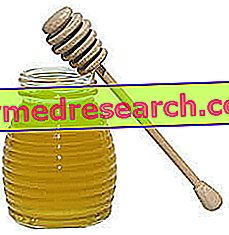See also: honey or sugar? Nutritional values honey and sugar
The relationship between honey and diabetes is inherent in the adjective "mellitus", which means sweet as honey (in reference to the sweet taste of urine).
One of the most frequently asked questions of diabetic individuals is whether or not honey is a good alternative to sugar. Although many people are convinced of the contrary, the answer is essentially negative.

Honey is also rich in vitamins, minerals and other useful substances for the body, while sugar provides empty calories, because it is rich in energy but extremely poor in micronutrients. However, despite being essential for our body's good health, these substances are in no way useful for glycemic control.
Ultimately, in diabetes, honey and sugar can be used without distinction, depending on your preference, but moderating their quantities; we remember that not only the quality of the food (glycemic index) counts, but also and above all the quantity ingested (glycemic load).
- Glycemic index of honey: 55
- Glycemic index of sucrose (cooking sugar): 61
As explained above, honey is all in all preferable to sugar, even in the presence of diabetes or prediabetes. However the differences on the glycemic response of the organism are minimal and the honey must therefore be consumed with the same parsimony of the sugar.



